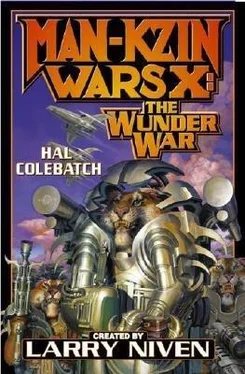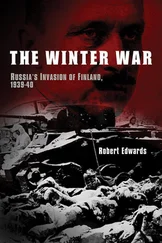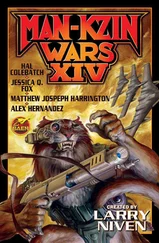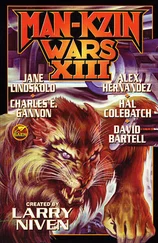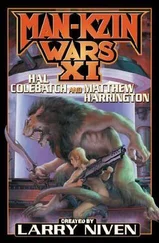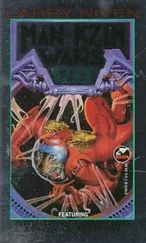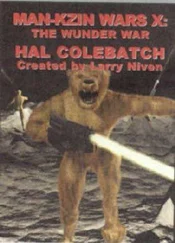“How do you propose to get it there?” asked Charrgh-Captain.
“Fly it, I suppose. It would make quite a sensation!”
“Fly it how? Can you see a drive on it?”
“Finagle's ghost!”
“I did wonder how long it would take you to notice that.”
They peered into the deep-radar ghost of the thing. Melody said, “There are massive fusion toroids, and what look like fuel tanks, part full. You can see there are massive stores of both hydrogen and heavy elements. The center of the thing, at least, seems to be built more of less on a pattern of concentric spheres.”
“A good shape for a warship. As little surface as possible to target,” said Charrgh-Captain. “But the surface itself is not spherical. It is intuition only, but I feel-see a resemblance to the architecture of a computer whose cognitive cells are linked to give a cascading effect.”
“Are you saying it is a computer, Charrgh-Captain?”
“No, I am saying it reminds me of one. What would such a computer do? No, sense tells me it is a spaceship whose design is too alien for us to understand.”
“Drives must be there, if only we can find them,” said Gay. “Let's look systematically.”
“The ancient Slaver style of hyperdrive could not function until light-speed had nearly been reached,” said Richard some time later. He turned away from a search of the deep-radar images. The Whomping Wallaby 's main computer screen was large, but he had almost covered it with boxes of data. “The ancient craft needed massive conventional subluminal engines to accelerate them initially. But Charrgh-Captain is right: There are no propulsive engines apparent here. Despite the fusion-toroids, I see no ramscoop collector-head. And even a ramscoop would need something to boost it initially. There is no surface for either the discharge of a laser drive or to receive the impact of a pushing laser, unless that bulging circle has something to do with it. There are no reaction-drive ports. They did not have the Jotoki-Kzinti gravity-drive. There are only relatively tiny attitude-jets, which can maneuver it around various axes but can do little else. So we have a spaceship without a drive.”
“What about a sailing ship? Might it have had a lightsail?”
“It's too big. No buildable lightsail could move that mass. And why build a sailing ship when they had a hyperdrive? Besides, what good is a lightsail when you're being attacked by enemy warships? It's vulnerable and it's hard to maneuver at all. Thrintun had others do most of their thinking for them, so even if they weren't too bright they weren't too primitive, and they had had thousands of years to refine their ships, with Tnuctipun input.”
“Could it be a naval base rather than a ship?” asked Peter Robinson. “That would account for the size. Why, hundreds of years ago humans blew up Confinement Asteroid into something bigger than this. Sol's old Gibraltar base is bigger. So are Tiamat and many others. That might account for the massive fuel tanks: fleet replenishment.”
“I see no docking ports,” said Charrgh-Captain. His pursuit of the answer to the puzzle seemed for the moment to have overcome even his loathing for the Wunderkzin, so that he answered him thoughtfully. “And would not a base have workshops, accommodation for crews, and defensive weapons? We see no evidence of any of those things. The sensor shows gold, which may be worth stripping. But this”—he stabbed at one of the boxes of light on the screen—“I do not like. These read like organic compounds.”
“Yes,” said Gatley Ivor. “That is the composition of thrint tissue. I agree it is not reassuring. But it is apparently quite inert.”
“Thrint corpses?” asked Melody.
“Great masses of inert organic tissue. That's all I can say so far.”
“Thrint and tnuctipun were both carnivores. If this was a tnuctip artifact I would suggest a larder of enemy's meat.”
“The thrintun sent out a command that every sapient mind must die,” said Gatley Ivor. “The open question is, did they include themselves? The survival of the Grogs on Down suggests they didn't. We aren't sure, though. Perhaps they thought life without slaves would be no life at all, and they might as well all die together. Some think they had degenerated to the point that, left to their own devices, they could hardly have fed themselves, let alone maintained complex machinery and the luxurious conditions they had come to need. Students have been awarded doctorates for arguing for and against both propositions. Anyway, they died. The Grogs might be descendants of a late-emerging group.”
Gay struck her fist on the table with a shout of triumph. “An ark! It's an ark! That's the only explanation!”
“Arrk?” Charrgh-Captain pronounced the word easily, but his ears betrayed puzzlement.
“A refuge, to preserve some remnant of their race so that they might begin again. That also accounts for the setup in the control chamber: They knew no one else was coming to get them out… The series of clocks to switch off the main stasis field is a series of fail-safes.”
“Fine,” said Richard. “But where are they? Peter detects no trace of alien minds. There's all that inert tissue. Slavers in frozen sleep?”
“No. A DNA bank, maybe. Slaver genetic material with mechanisms for rearing little Slavers. That might not need much space. All that tissue… like the yolk in an egg. Food.”
“Slaver genetic material? There's a nasty thought! What do we do?”
“Destroy it at once!” Charrgh-Captain's voice contained no doubt.
“We have a little time, I think. They can hardly produce adult thrintun instantaneously. And there still appears to be no activity but a very faint energy discharge.”
“And where,” said Gatley Ivor, “are the facilities for young thrintun? There would be crèches, surely. Things of that nature. We know they took several years to mature and develop the Power. As infants, even as adolescents, they would need to be cared for, disciplined, taught. It would cost little to have living slaves to care for them—during the time spent in stasis they would consume no stores—and, indeed, why not living Thrint adults to direct the slaves? Why did the adult Slavers who built the ark not take the elementary step of preserving their own lives inside it?”
“Maybe they are the thrintun in the control chamber,” said Gay. “Maybe there were other facilities outside the stasis field that have been lost. Perhaps they were attacked and had to put it into stasis before the crew could be embarked.”
“It seems the artifact came out of stasis periodically, and then returned to it,” said Charrgh-Captain. “Why should an arrk do that?”
“That is simple. They wished to ensure their enemies were truly dead,” said Peter Robinson. “Perhaps when they first emerged from stasis they detected mental emanations from live tnuctipun. Perhaps not all tnuctipun were killed by the suicide command: They may have been coming out of their own stasis-protected arks and shelters for some time. This thrintun ark would return to stasis till all possible enemies were dead.”
“That doesn't quite fit, Peter,” said Richard. “The great floating stasis-bubble would be vulnerable to attack if any tnuctipun were still around. They could detect it, close on it, turn off the field—child's play for the tnuctipun, who invented the field anyway—and do a thorough job of destroying whatever was inside. And if it was an ark like that, one would expect it to be defensively armed, as well as mobile. Besides, given that a lot of genetic material might have been preserved in a small space, a smaller artifact would surely have been big enough.
“Another possibility occurs to me. Suppose the thrint knew the simple, blanket suicide command—easier to transmit, perhaps, than a selective one to kill slaves only—would get them too? Surely many would seek refuge in stasis fields. But they would have no one to get them out. The purpose of this artifact and its array of clocks may be to ensure that some would come out of stasis in the future to release others elsewhere.”
Читать дальше
